【BBC六分钟英语】人工智能可以用来破获谋杀案吗?
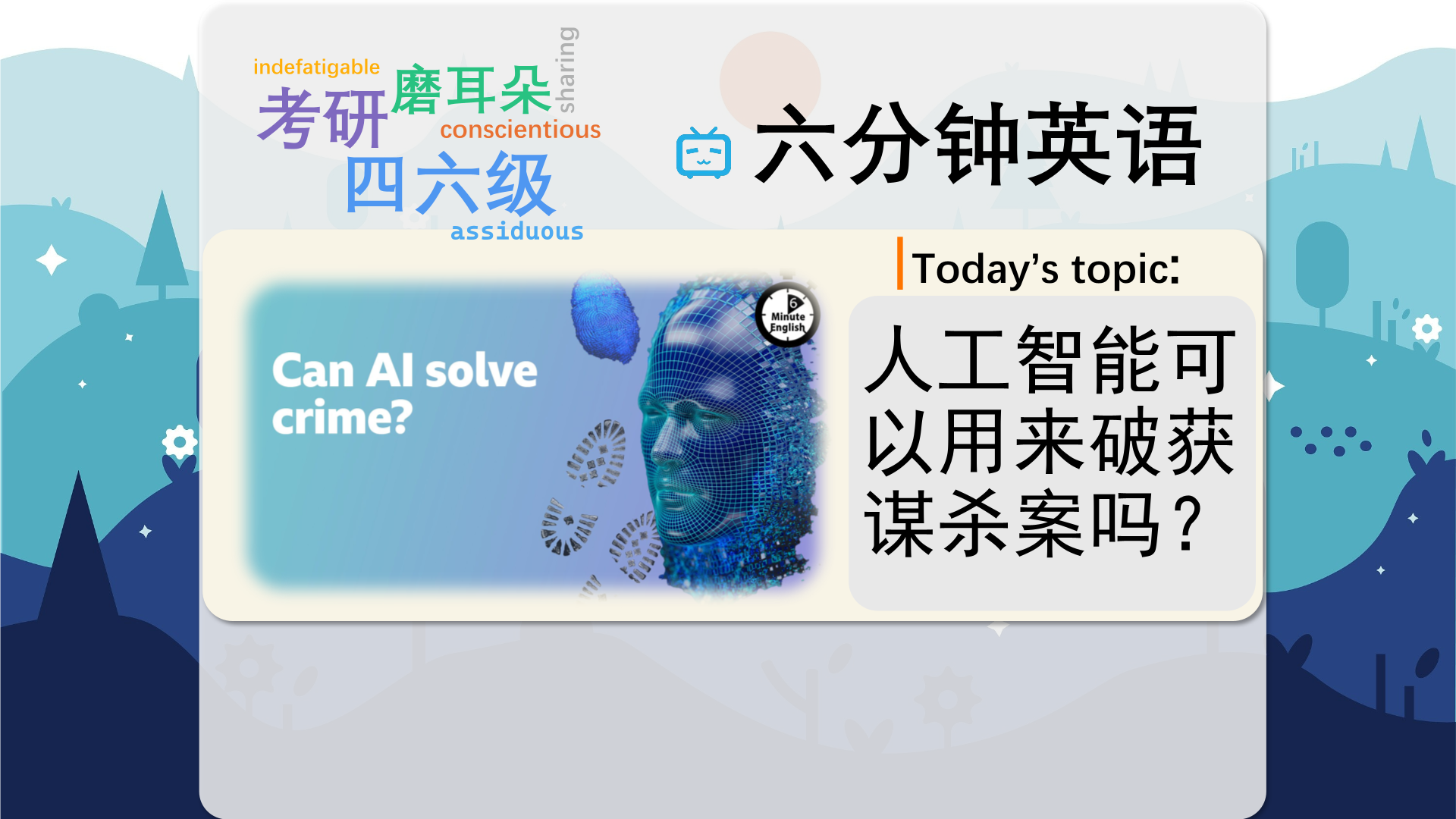
【英文脚本】
Beth
Hello and welcome to 6 Minute English from BBC Learning English. I’m Beth.
Neil
And I’m Neil. Don’t forget that you can find a transcript and a quiz for this episode on our website, bbclearningenglish.com.
Beth
Now today, Neil, we’re talking all about solving crime. Do you think you’d be a good detective?
Neil
Actually, no, Beth. I think my brain’s not very good with details! Today, we’ll be talking about how artificial intelligence might help detectives and the police investigate crimes. But first, I have a question for you, Beth, in the UK, lots of people enjoy watching fictional detectives on TV. These programmes are called murder mysteries and tell the story of a detective solving a crime. In 2020, a magazine called the Radio Times asked readers who their favourite TV detective was. So, who do you think was the most popular? Was it: a) Sherlock Holmes, b) Hercule Poirot, or c) Miss Marple?
Beth
Surely it’s Sherlock Holmes?
Neil
Well, you sound very sure, but I will reveal the answer at the end of the programme. Now, when the police are investigating crimes in the real world, their techniques are often quite different from what we see on television.
Beth
Yes. Solving crimes involves collecting and reviewing lots of evidence, like DNA, fingerprints, or CCTV.
Neil
All of this work takes a lot of time. So, can AI help police speed up the work and even solve crimes? That’s the question listener Alastair had for BBC Radio 4 programme The Artificial Human. And host Aleks Krotoski wanted to know more.
Aleks Krotoski
So, Alastair, why are you asking this question? Tell us a little bit more about yourself and where you’re coming from?
Alastair
So, my name’s Alastair and I’m a serving police officer. My background is with investigation. I’m looking at artificial intelligence and thinking, “What can it do for me?”
Beth
Alex asks Alastair to explain where he’s coming from. This means explain his perspective or point of view. In informal English, we’ll often ask someone, “Do you get where I’m coming from?” And we’re asking whether they understand our opinion or perspective.
Neil
Alastair explains that he’s interested in how artificial intelligence could help solve crimes, because he’s a police officer with a background in investigations. If you have a background in something, it means most of your previous work or experience was related to something. For example, I work as a producer at BBC Learning English now, making programmes, but my background is in classroom teaching.
Beth
Alastair talks about using artificial intelligence for training and asks, “What can it do for me?” This means, “How can artificial intelligence help or improve something?”
Neil
When a crime happens, police officers have to collect and review a lot of information to find evidence. When you have a lot of information to review, it can be difficult to know what’s important and find patterns which might be relevant to the crime.
Beth
But Professor Ruth Morgan, an expert in crime and forensic science, thinks AI could help speed up police work, as she told BBC Radio 4’s The Artificial Human.
Ruth Morgan
I think we’re seeing a renaissance in the pattern-recognition forms of evidence, so finger marks, footwear marks. There’s been lots of challenges with those forms of evidence over the last ten years, probably going a little bit out of favour. And yet what we’re beginning to see now with AI is that you can take a photo of a mark with your phone, compare that mark to the database and get real-time insight.
Neil
Ruth says that there is a renaissance in looking at patterns in evidence, such as finger marks or footwear marks. Renaissance means new interest or activity in a particular topic or area.
Beth
This kind of evidence went a little bit out of favour over recent years because of the excitement around DNA evidence. If something is out of favour, it is less popular or appealing.
Neil
But AI could mean that patterns in finger marks or footwear marks are useful in solving crimes again. This is because AI can be used to compare a picture of a mark with a database of pictures from other crimes and get real-time insight. The adjective real-time means the information is presented at the same time that it’s happening.
Beth
Yes. AI can compare lots of information very quickly, which makes finding patterns in evidence much easier and more reliable.
Neil
There are some problems with using AI to solve crimes though.
Beth
To find these patterns, lots of private information would need to be collected, and police usually have to give clear reasons why they need access to certain information in their investigations.
Neil
It’s unlikely an AI-powered robot would ever replace a detective anytime soon!
Beth
Yes, and that reminds me of your question, Neil. I said that Sherlock Holmes was maybe the most popular detective. Was I right?
Neil
You were absolutely right. And I think people should try the quiz on our website to find out how much they know as well. It’s at bbclearningenglish.com. OK. Let’s recap the vocabulary we’ve learned, starting with the expression where you’re coming from, which means your opinion or perspective on something.
Beth
Your background is the area that you have the most work experience in.
Neil
The question ‘what can this do for me?’ means ‘how can this help or improve things?’
Beth
Renaissance means new interest or activity in something.
Neil
If something is out of favour, it has become less popular or appealing.
Beth
And the adjective real-time means information is presented as it is happening.
Neil
Once again, our six minutes are up. Head to our website to find more episodes of 6 Minute English at bbclearningenglish.com. Bye for now!
Beth
Bye!
【中英文双语脚本】
Beth(贝丝)
Hello and welcome to 6 Minute English from BBC Learning English. I’m Beth.
您好,欢迎来到 BBC Learning English 的 6 Minute English。我是贝丝。
Neil(尼尔)
And I’m Neil. Don’t forget that you can find a transcript and a quiz for this episode on our website, bbclearningenglish.com.
我是 Neil。不要忘记,您可以在我们的网站 bbclearningenglish.com 上找到本集的文字记录和测验。
Beth(贝丝)
Now today, Neil, we’re talking all about solving crime. Do you think you’d be a good detective?
现在今天,Neil,我们谈论的是关于破案的一切。你觉得你会成为一名优秀的侦探吗?
Neil(尼尔)
Actually, no, Beth. I think my brain’s not very good with details! Today, we’ll be talking about how artificial intelligence might help detectives and the police investigate crimes. But first, I have a question for you, Beth, in the UK, lots of people enjoy watching fictional detectives on TV. These programmes are called murder mysteries and tell the story of a detective solving a crime. In 2020, a magazine called the Radio Times asked readers who their favourite TV detective was. So, who do you think was the most popular? Was it: a) Sherlock Holmes, b) Hercule Poirot, or c) Miss Marple?
其实,不,贝丝。我觉得我的大脑不太擅长细节!今天,我们将讨论人工智能如何帮助侦探和警方调查犯罪。但首先,我有一个问题要问你,贝丝,在英国,很多人都喜欢在电视上看虚构的侦探。这些节目被称为谋杀之谜,讲述了一名侦探破案的故事。2020 年,一本名为 Radio Times 的杂志询问读者他们最喜欢的电视侦探是谁。那么,您认为谁最受欢迎?是:a) 夏洛克·福尔摩斯,b) 赫尔克里·波洛,还是 c) 马普尔小姐?
Beth(贝丝)
Surely it’s Sherlock Holmes?
肯定是夏洛克·福尔摩斯吧?
Neil(尼尔)
Well, you sound very sure, but I will reveal the answer at the end of the programme. Now, when the police are investigating crimes in the real world, their techniques are often quite different from what we see on television.
嗯,你听起来很确定,但我会在节目结束时透露答案。现在,当警察在现实世界中调查犯罪时,他们的技术往往与我们在电视上看到的完全不同。
Beth(贝丝)
Yes. Solving crimes involves collecting and reviewing lots of evidence, like DNA, fingerprints, or CCTV.
是的。破案涉及收集和审查大量证据,例如 DNA、指纹或闭路电视。
Neil(尼尔)
All of this work takes a lot of time. So, can AI help police speed up the work and even solve crimes? That’s the question listener Alastair had for BBC Radio 4 programme The Artificial Human. And host Aleks Krotoski wanted to know more.
所有这些工作都需要大量时间。那么,人工智能可以帮助警方加快工作速度,甚至破案吗?这是听众 Alastair 在 BBC Radio 4 节目 The Artificial Human 中提出的问题。主持人 Aleks Krotoski 想了解更多。
Aleks Krotoski(亚历克斯·克罗托斯基)
So, Alastair, why are you asking this question? Tell us a little bit more about yourself and where you’re coming from?
那么,Alastair,你为什么要问这个问题呢?请告诉我们更多关于您自己以及您来自哪里的信息?
Alastair(阿拉斯泰尔)
So, my name’s Alastair and I’m a serving police officer. My background is with investigation. I’m looking at artificial intelligence and thinking, “What can it do for me?”
所以,我叫 Alastair,是一名在职警官。我的背景是调查。我正在研究人工智能,并思考,’它能为我做什么?
Beth(贝丝)
Alex asks Alastair to explain where he’s coming from. This means explain his perspective or point of view. In informal English, we’ll often ask someone, “Do you get where I’m coming from?” And we’re asking whether they understand our opinion or perspective.
亚历克斯让阿拉斯泰尔解释他来自哪里。这意味着解释他的观点或观点。在非正式的英语中,我们经常会问某人,’你明白我从哪里来吗?我们问他们是否理解我们的观点或观点。
Neil(尼尔)
Alastair explains that he’s interested in how artificial intelligence could help solve crimes, because he’s a police officer with a background in investigations. If you have a background in something, it means most of your previous work or experience was related to something. For example, I work as a producer at BBC Learning English now, making programmes, but my background is in classroom teaching.
Alastair 解释说,他对人工智能如何帮助破案感兴趣,因为他是一名具有调查背景的警察。如果你有某方面的背景,这意味着你之前的大部分工作或经历都与某事有关。例如,我现在是 BBC Learning English 的制片人,制作节目,但我的背景是课堂教学。
Beth(贝丝)
Alastair talks about using artificial intelligence for training and asks, “What can it do for me?” This means, “How can artificial intelligence help or improve something?”
Alastair 谈到了使用人工智能进行培训,并问道:“它能为我做什么?这意味着,’人工智能如何帮助或改进某事?
Neil(尼尔)
When a crime happens, police officers have to collect and review a lot of information to find evidence. When you have a lot of information to review, it can be difficult to know what’s important and find patterns which might be relevant to the crime.
当犯罪发生时,警察必须收集和审查大量信息以查找证据。当您有大量信息需要查看时,可能很难知道什么是重要的并找到可能与犯罪相关的模式。
Beth(贝丝)
But Professor Ruth Morgan, an expert in crime and forensic science, thinks AI could help speed up police work, as she told BBC Radio 4’s The Artificial Human.
但犯罪和法医学专家 Ruth Morgan 教授认为,人工智能可以帮助加快警方的工作,正如她告诉 BBC Radio 4 的 The Artificial Human 一样。
Ruth Morgan(露丝·摩根)
I think we’re seeing a renaissance in the pattern-recognition forms of evidence, so finger marks, footwear marks. There’s been lots of challenges with those forms of evidence over the last ten years, probably going a little bit out of favour. And yet what we’re beginning to see now with AI is that you can take a photo of a mark with your phone, compare that mark to the database and get real-time insight.
我认为我们正在看到证据的模式识别形式的复兴,比如指纹、鞋印。在过去十年中,这些形式的证据面临很多挑战,可能有点失宠。然而,我们现在开始看到的 AI 是,你可以用手机拍下标记的照片,将该标记与数据库进行比较,并获得实时洞察。
Neil(尼尔)
Ruth says that there is a renaissance in looking at patterns in evidence, such as finger marks or footwear marks. Renaissance means new interest or activity in a particular topic or area.
Ruth 说,寻找证据模式(例如指纹或鞋印)正在复兴。文艺复兴是指对特定主题或领域的新兴趣或活动。
Beth(贝丝)
This kind of evidence went a little bit out of favour over recent years because of the excitement around DNA evidence. If something is out of favour, it is less popular or appealing.
近年来,由于人们对 DNA 证据的兴奋,这种证据有点失宠。如果某样东西不受欢迎,它就不那么受欢迎或吸引人。
Neil(尼尔)
But AI could mean that patterns in finger marks or footwear marks are useful in solving crimes again. This is because AI can be used to compare a picture of a mark with a database of pictures from other crimes and get real-time insight. The adjective real-time means the information is presented at the same time that it’s happening.
但人工智能可能意味着指纹或鞋印的图案有助于再次破案。这是因为 AI 可用于将商标图片与其他犯罪图片数据库进行比较,并获得实时洞察。形容词 real-time 表示信息在发生的同时呈现。
Beth(贝丝)
Yes. AI can compare lots of information very quickly, which makes finding patterns in evidence much easier and more reliable.
是的。AI 可以非常快速地比较大量信息,这使得在证据中寻找模式变得更加容易和可靠。
Neil(尼尔)
There are some problems with using AI to solve crimes though.
不过,使用 AI 破案存在一些问题。
Beth(贝丝)
To find these patterns, lots of private information would need to be collected, and police usually have to give clear reasons why they need access to certain information in their investigations.
要找到这些模式,需要收集大量私人信息,警方通常必须给出明确的理由,说明为什么他们在调查中需要访问某些信息。
Neil(尼尔)
It’s unlikely an AI-powered robot would ever replace a detective anytime soon!
人工智能机器人不太可能在短期内取代侦探!
Beth(贝丝)
Yes, and that reminds me of your question, Neil. I said that Sherlock Holmes was maybe the most popular detective. Was I right?
是的,这让我想起了你的问题,Neil。我说夏洛克·福尔摩斯可能是最受欢迎的侦探。我是对的吗?
Neil(尼尔)
You were absolutely right. And I think people should try the quiz on our website to find out how much they know as well. It’s at bbclearningenglish.com. OK. Let’s recap the vocabulary we’ve learned, starting with the expression where you’re coming from, which means your opinion or perspective on something.
你说得完全正确。我认为人们应该尝试我们网站上的测验,看看他们也知道多少。它 bbclearningenglish.com。还行。让我们回顾一下我们学到的词汇,从 your come from the expression 开始,意思是你对某事的看法或观点。
Beth(贝丝)
Your background is the area that you have the most work experience in.
您的背景是您拥有最多工作经验的领域。
Neil(尼尔)
The question ‘what can this do for me?’ means ‘how can this help or improve things?’
‘这对我有什么作用’的问题意味着’这如何帮助或改善事情?
Beth(贝丝)
Renaissance means new interest or activity in something.
文艺复兴意味着对某事的新兴趣或活动。
Neil(尼尔)
If something is out of favour, it has become less popular or appealing.
如果某件事不受欢迎,它就会变得不那么受欢迎或吸引人。
Beth(贝丝)
And the adjective real-time means information is presented as it is happening.
形容词 real-time 的意思是信息在发生时呈现。
Neil(尼尔)
Once again, our six minutes are up. Head to our website to find more episodes of 6 Minute English at bbclearningenglish.com. Bye for now!
我们的六分钟又结束了。前往我们的网站查找六分钟英语at bbclearningenglish.com 的更多剧集。再见!
Beth(贝丝)
Bye!
再见!

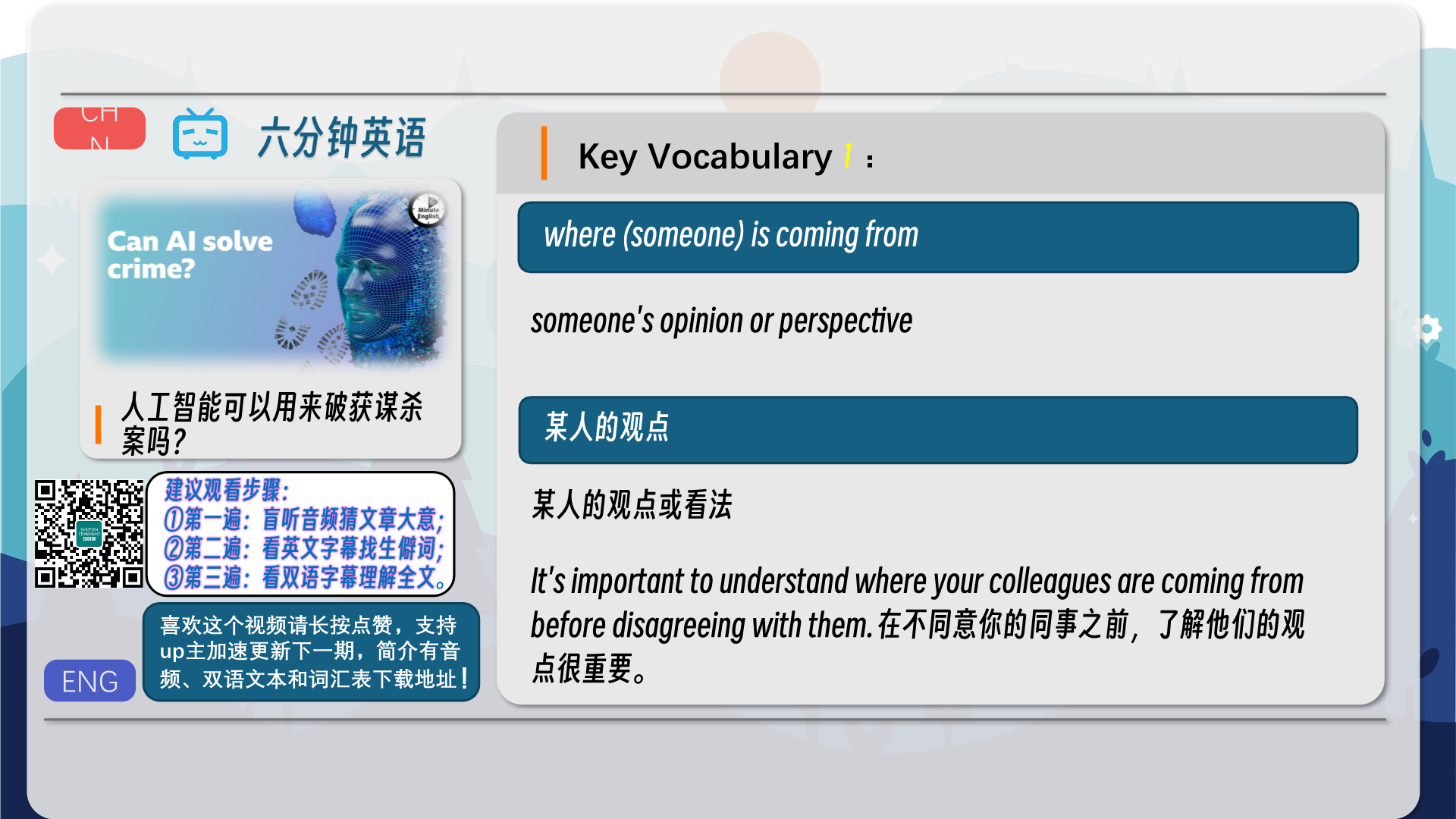
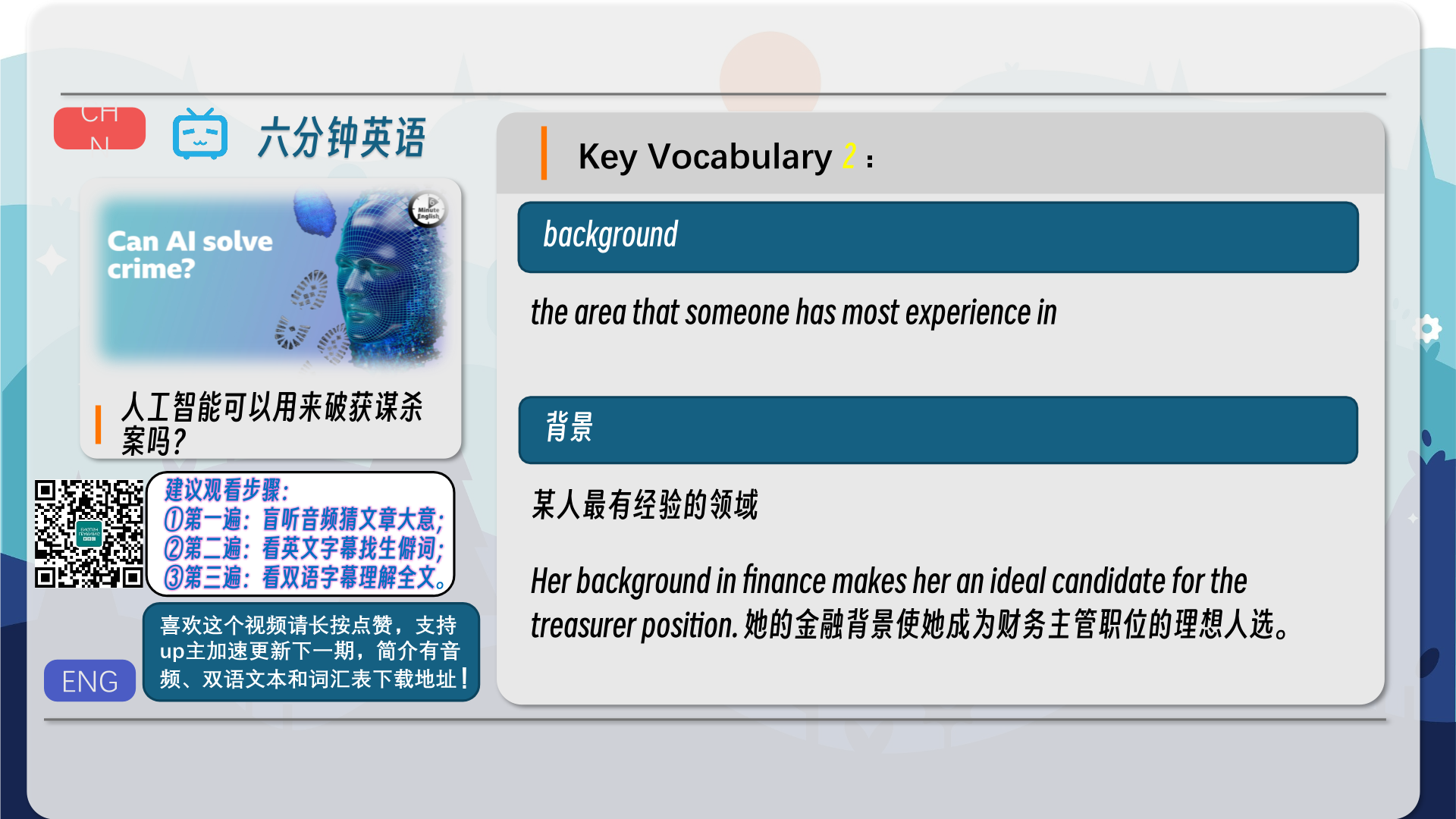
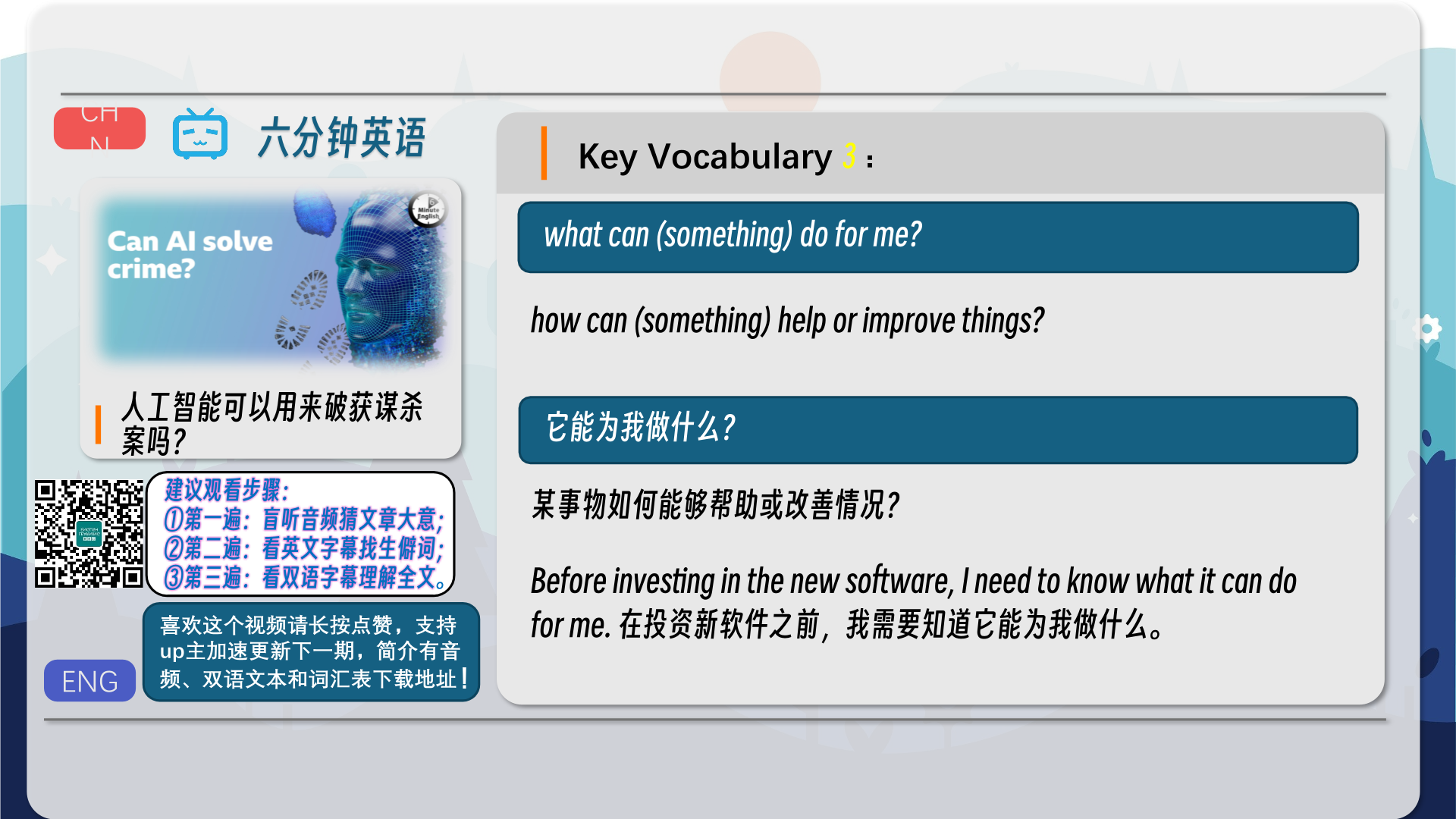
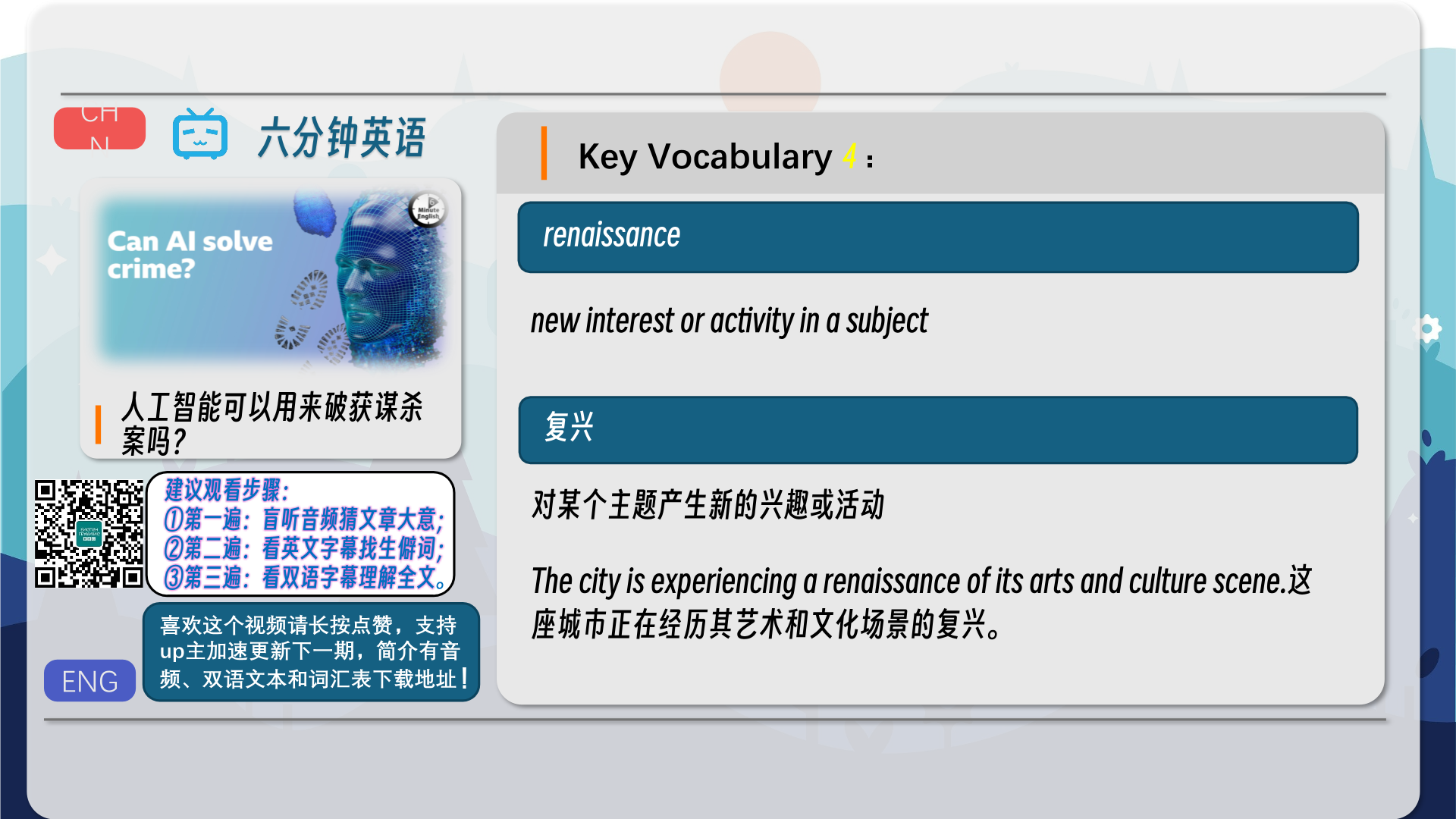
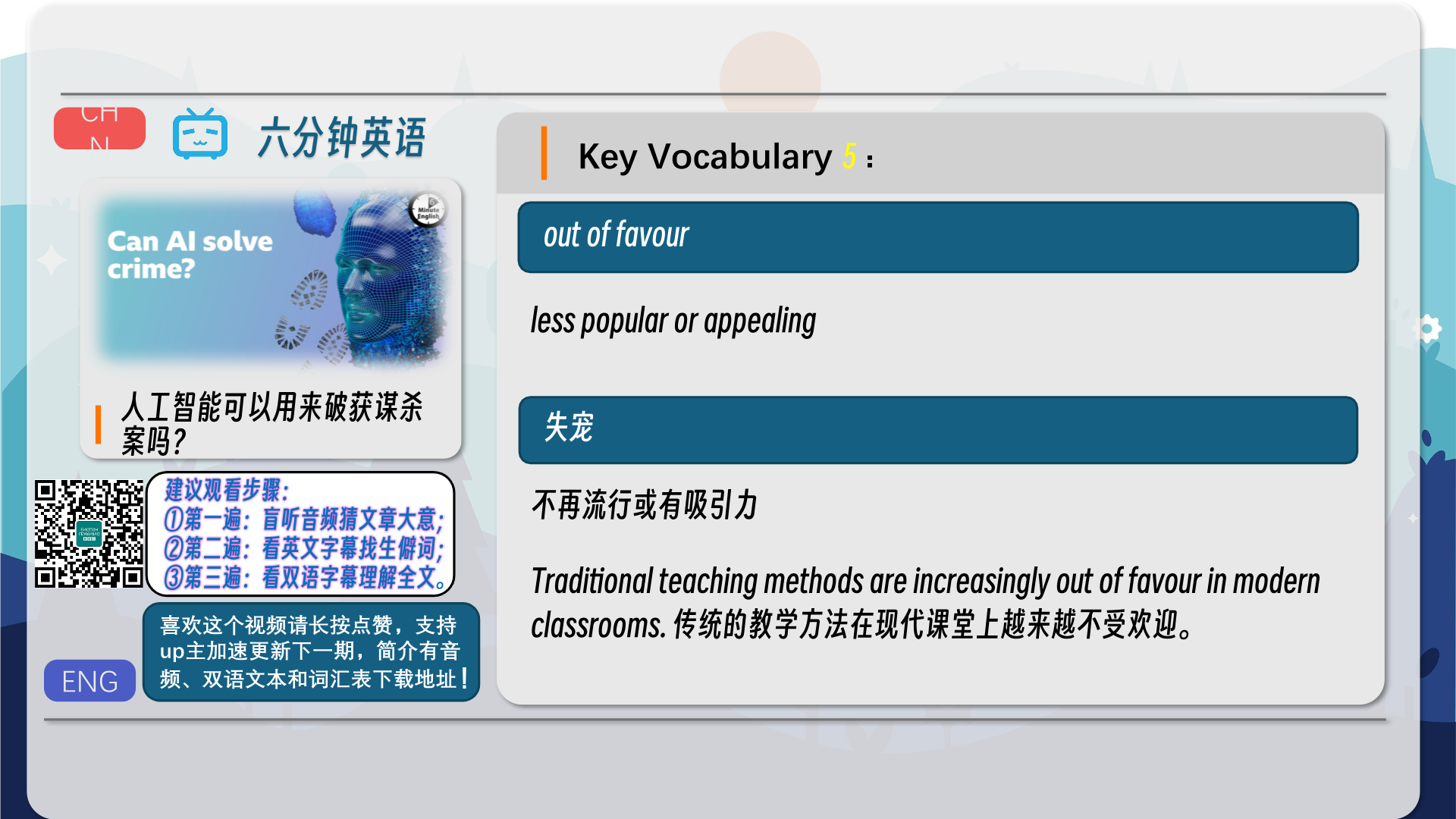
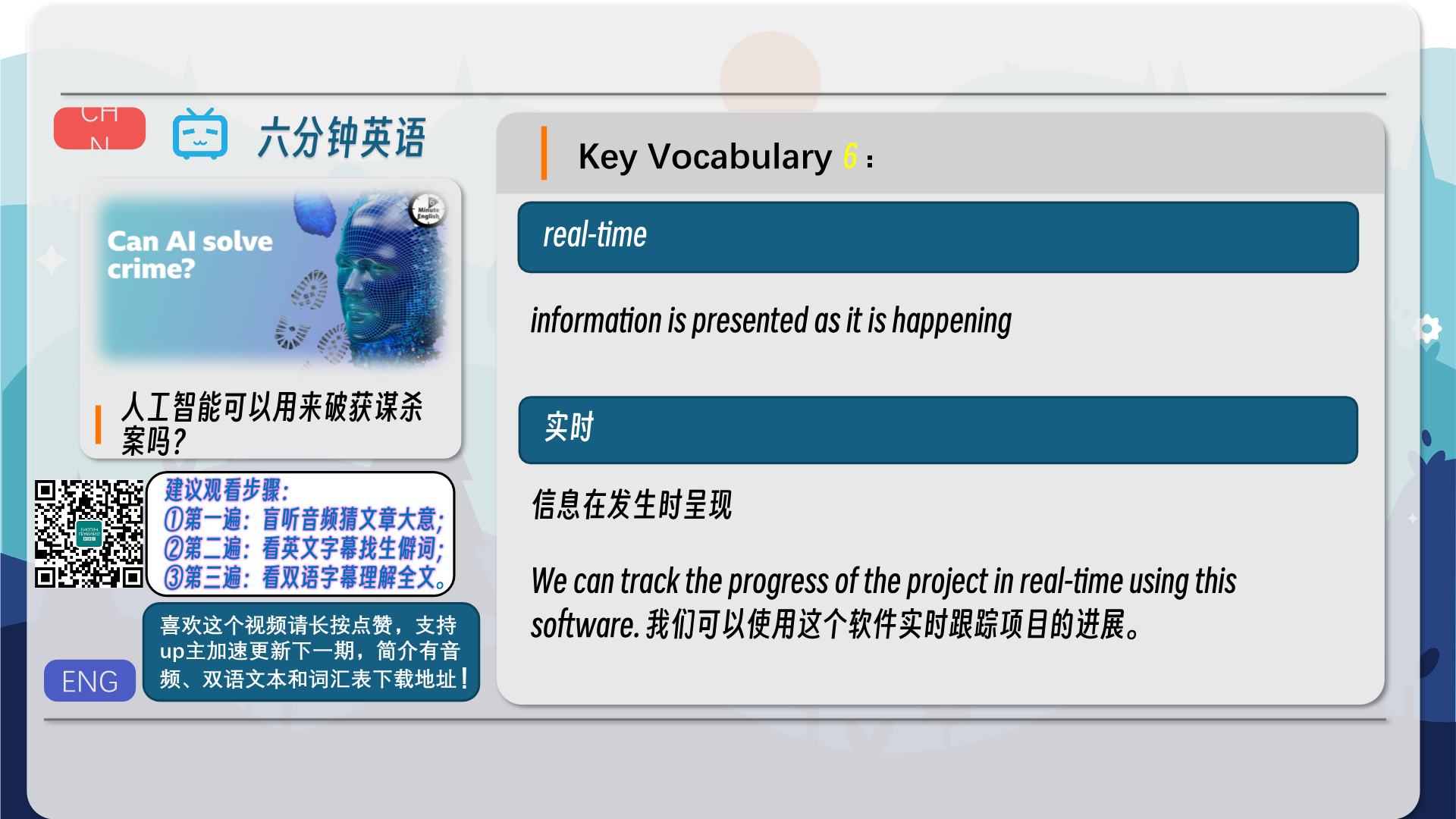
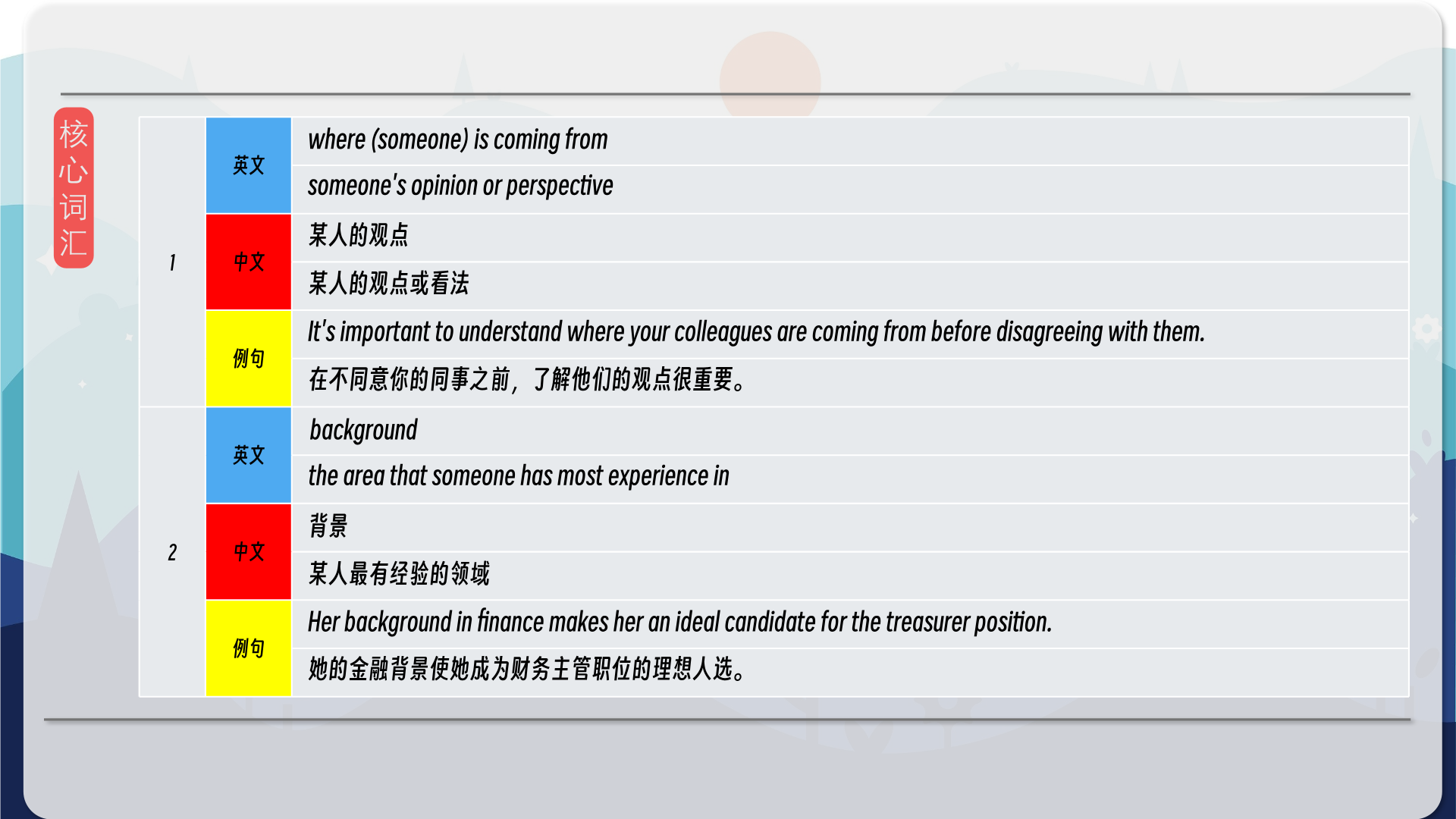
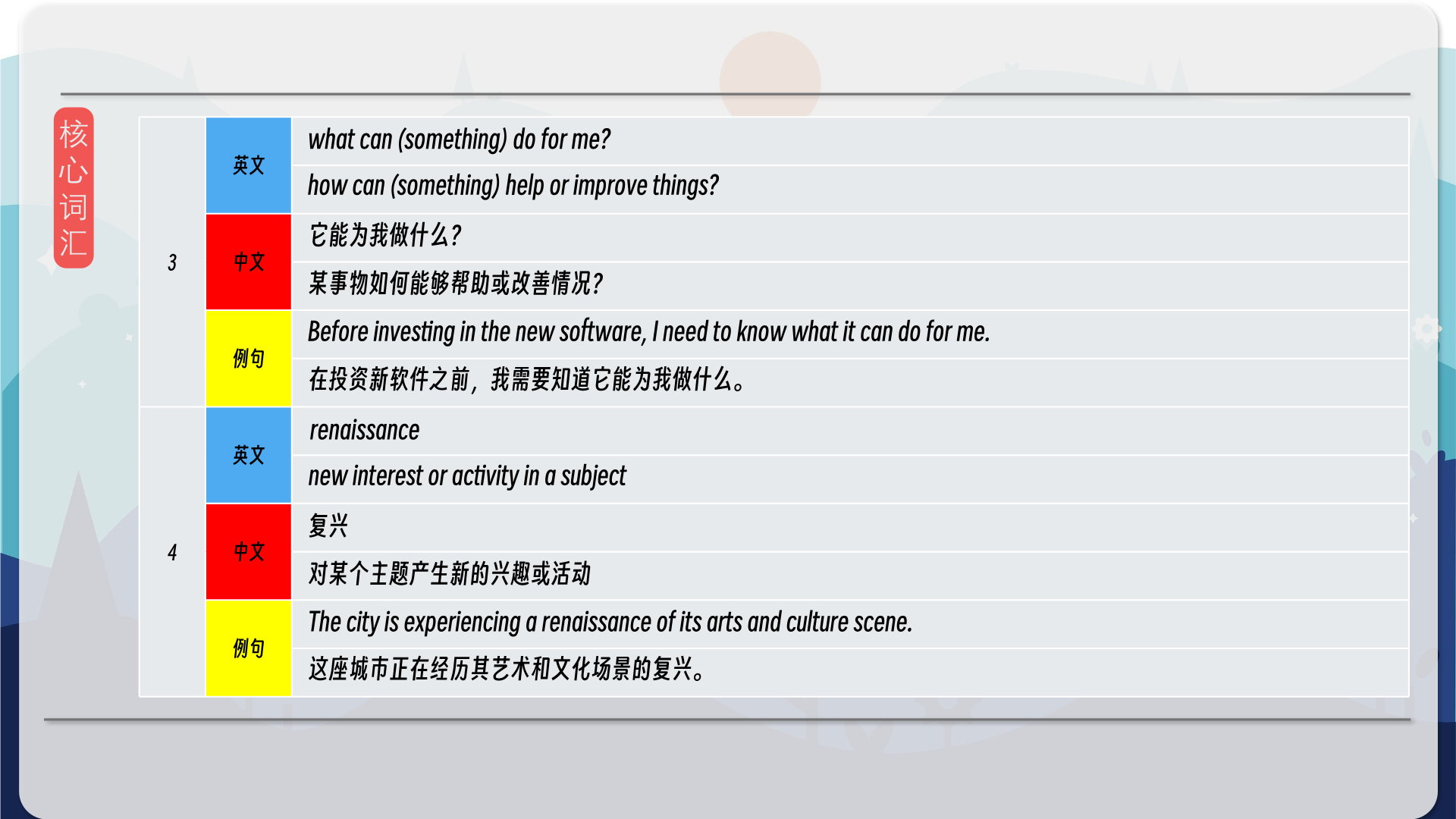
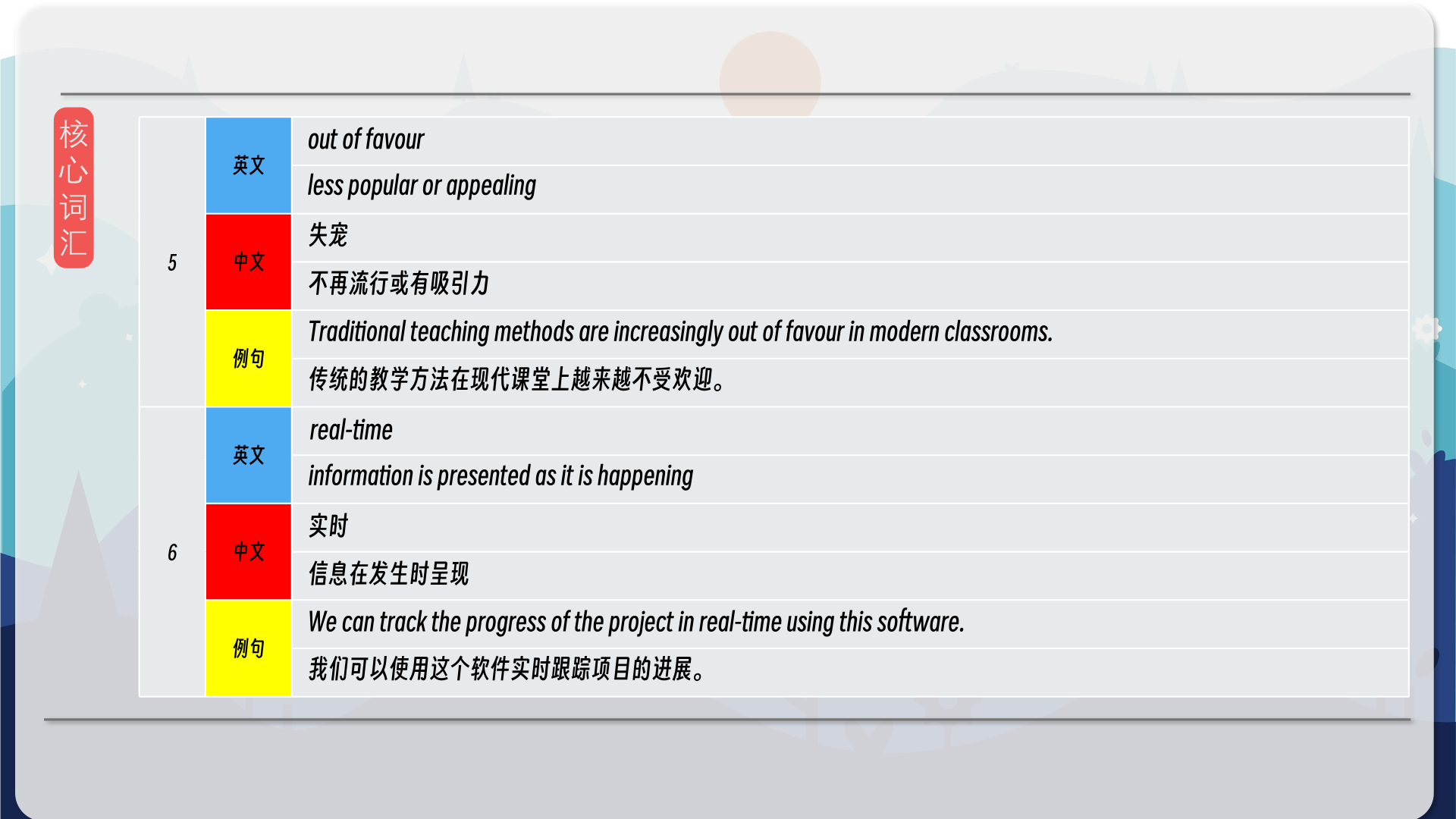
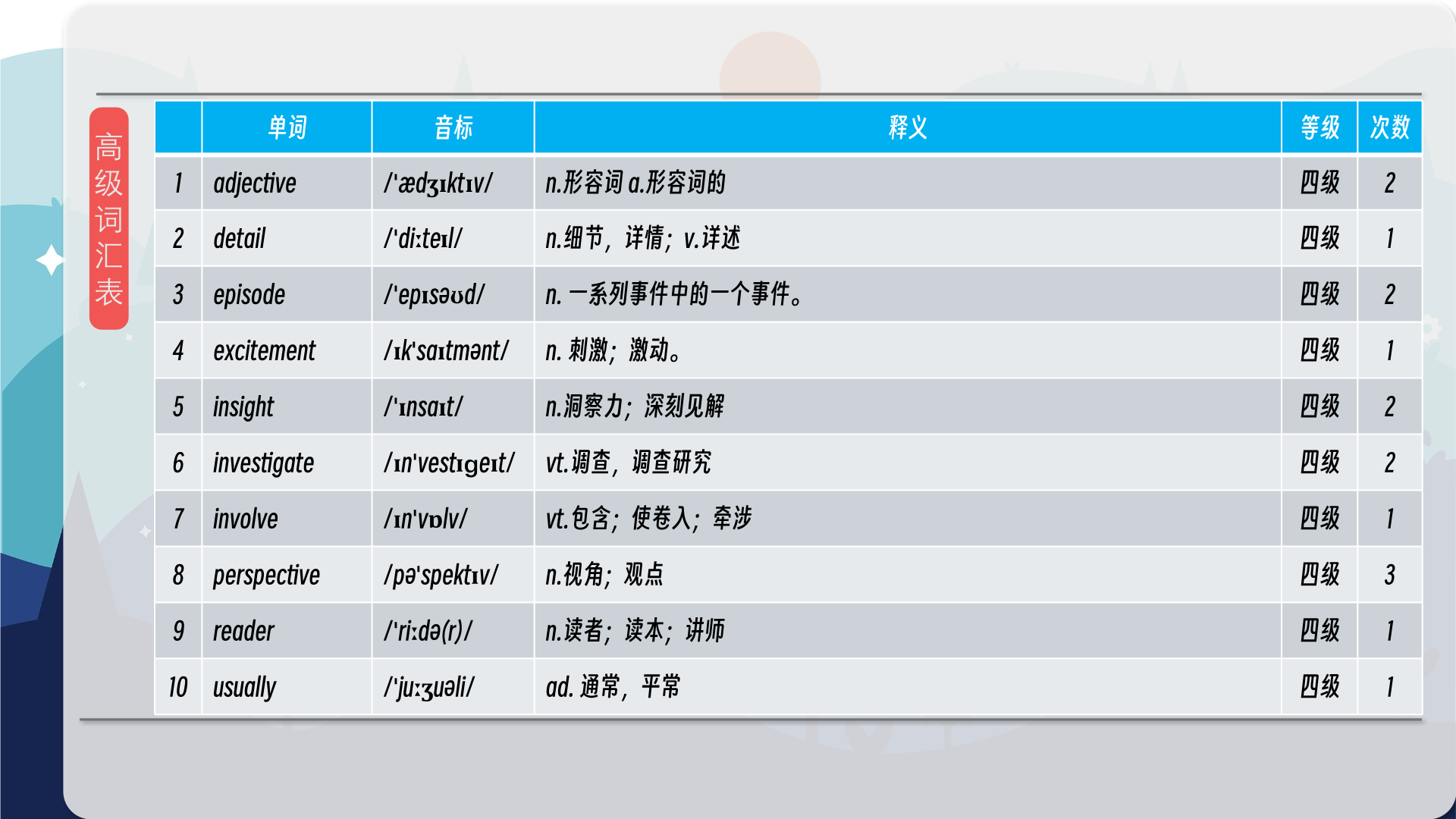
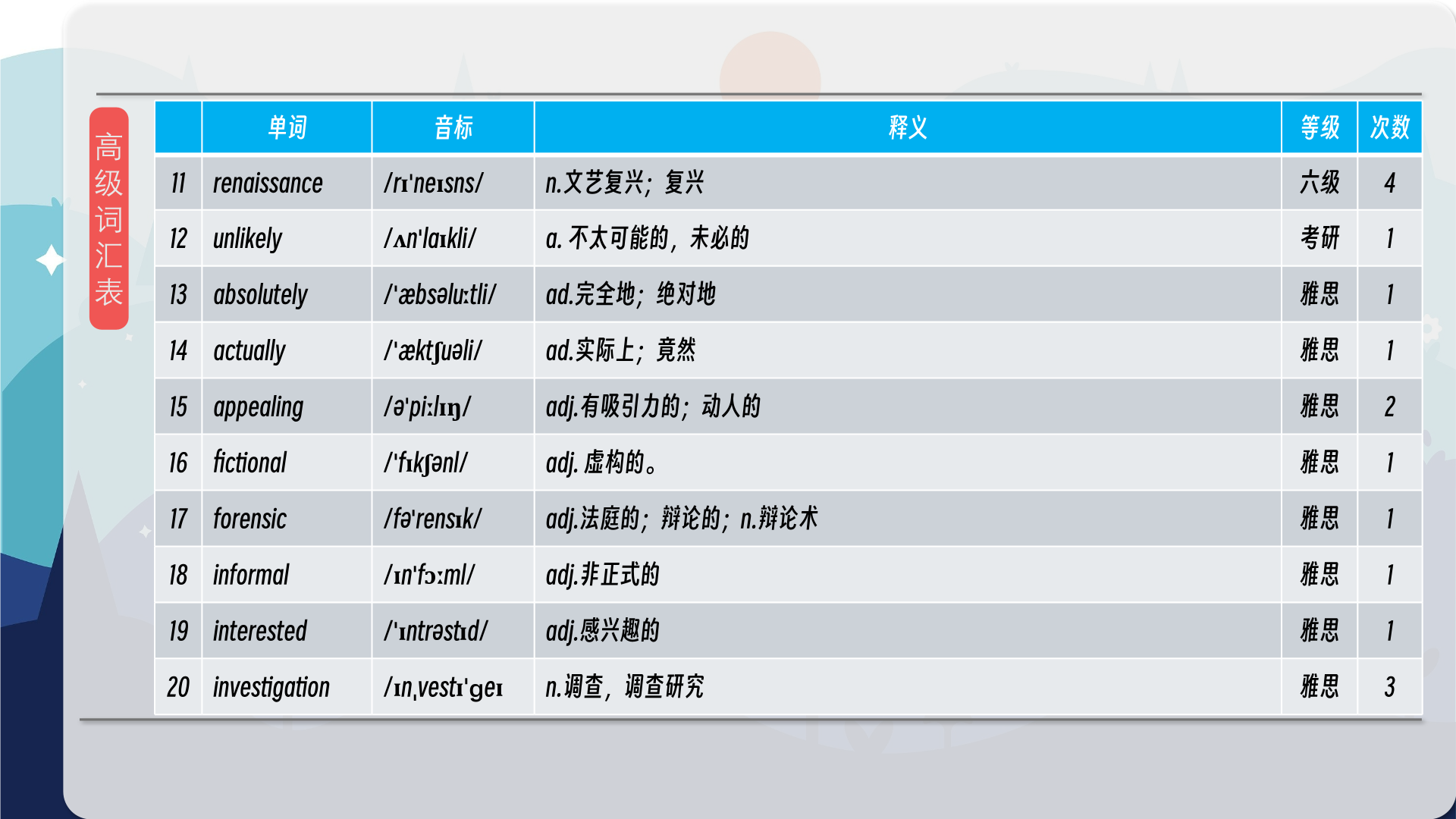
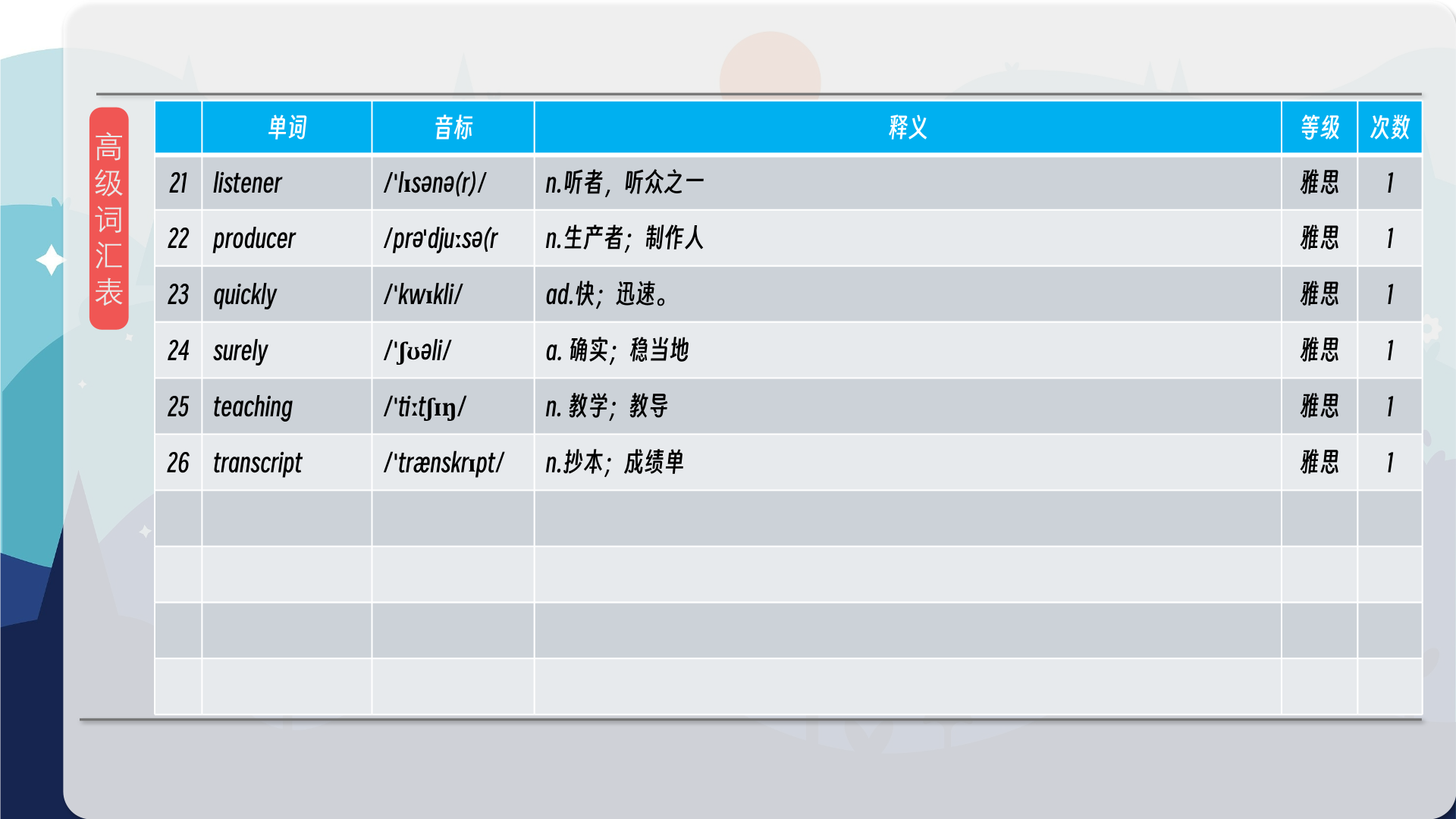

【核心词汇】
where (someone) is coming from
someone’s opinion or perspective
某人的观点
某人的观点或看法
It’s important to understand where your colleagues are coming from before disagreeing with them.
在不同意你的同事之前,了解他们的观点很重要。
background
the area that someone has most experience in
背景
某人最有经验的领域
Her background in finance makes her an ideal candidate for the treasurer position.
她的金融背景使她成为财务主管职位的理想人选。
what can (something) do for me?
how can (something) help or improve things?
它能为我做什么?
某事物如何能够帮助或改善情况?
Before investing in the new software, I need to know what it can do for me.
在投资新软件之前,我需要知道它能为我做什么。
renaissance
new interest or activity in a subject
复兴
对某个主题产生新的兴趣或活动
The city is experiencing a renaissance of its arts and culture scene.
这座城市正在经历其艺术和文化场景的复兴。
out of favour
less popular or appealing
失宠
不再流行或有吸引力
Traditional teaching methods are increasingly out of favour in modern classrooms.
传统的教学方法在现代课堂上越来越不受欢迎。
real-time
information is presented as it is happening
实时
信息在发生时呈现
We can track the progress of the project in real-time using this software.
我们可以使用这个软件实时跟踪项目的进展。
在公众号里输入6位数字,获取【对话音频、英文文本、中文翻译、核心词汇和高级词汇表】电子档,6位数字【暗号】在文章的最后一张图片,如【220728】,表示22年7月28日这一期。公众号没有的文章说明还没有制作相关资料。年度合集在B站【六分钟英语】工房获取,每年共计300+文档,感谢支持!